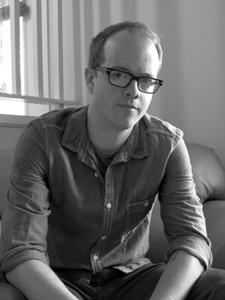Poetry's Linguistic Verve: L'Amour Lisik in Conversation with Danny Jacobs

Malahat volunteer L'Amour Lisik talks with Danny Jacobs about "Fatberg" and "Refinery Plea," his contribution of two poems to the Spring 2015 issue of the Malahat.
What initially inspired you to write about something as gross as a fatberg? How much research went into your poems, “Fatberg” and “Refinery Plea”?
My wife works in plumbing; one day she e-mailed me an article about a particularly massive one of these things clogging London’s sewers—a lot of it slowly built up from flushed cooking oil and wet wipes. I had never heard of fatbergs before. Amazing! It was one of those too-good-not-to-write-a-poem moments. I mean, c’mon: the term alone demanded a poem. I had to at least try. And sure, they are gross, but I think they earn more than that. Imagine some Waste Management staffer faced with such a structure—he might go limp with a sense of the sublime. Also, I’ve always liked poems that dabble in the ugly or the banal. The challenge is to turn your subject into something utterly other, charged with linguistic verve and potential meaning. Eric Ormsby is one of our masters at this type of thing. No one will ever write a better poem about the vacuum, the ironing board, the big toe. If pressed, Ormsby could knock off a sonically dense, image-thick, formally prodigious and not-at-all frivolous ode to, say, the cigarette butt receptacle outside your local mall. I hope he doesn’t write a fatberg poem.
For research, I turned to Google. Google’s great. You set out to look up one thing for a poem and then you’re down the rabbit hole. A few months ago, I was working on a poem about my snow blower and I ended up looking at parts lists—I came upon great terms like “augur” and “skid shoes”. I like nosing around in jargon—so many little gifts. For “Fatberg” I also dipped into Peter Ackroyd’s tome, London: A Biography. There’s a whole chapter called “Waste Matter”; it’s where I got the Latin stuff: “Sir Thomas More, in the early sixteenth century, uses five names of shit – cacus, merda, stercus, lutum, coenum – in his polemical work” (p. 339). Ackroyd’s referring to Utopia here.
I noticed both poems share a theme of industrialism and the detriment that humans bring on themselves and their environments. Ideally, which audience do you intend for this message to reach?
There’s some environmental comment in these poems, perhaps, but I hope they don’t come off as morally heavy-handed. That’s death for poems. My allegiance is to the poem; any lesson or commentary can only come second.
I don’t intend any specific audience. As a poet, I’m just happy to have a willing reader. I am aware of audience, though. I’d be tickled if someone simply read my poems and got a charge out of them for the 42 seconds it took to read them. That’s all we can ask for.
How important is it for a poem to have humour? Does humour come naturally into your poems or is it more of a vessel to carry larger, heavier messages?
The easy answer is that it depends on the poem and the poet. Humour is tricky. There’s laugh-out-loud humour (very rare in poetry; David McGimpsey comes to mind) and then there’s various modes of irony, wit, urbanity, etc (much more common in contemporary poetry). The latter tactic is probably a reaction to a certain earnestness and sentimentality that is now out of fashion. I employ humour and ironic distance in a lot of my poems but I think I have to be careful: it can become a default, a fallback. But I typically don’t expect (or look for) guffaws when I crack a volume of verse; I go elsewhere for belly laughs. Humour, if done right, can definitely act as a vessel to carry larger, heavier messages. Some poems can be funny on the surface, but carry a deeper sadness or anger after a second look. Or vice versa. Often the best poems usually work on these multiple registers.
You integrate both first-person and first-person-plural points of view in your poems. How does this dual perspective benefit your poems?
I’m not sure. Point of view and tense often present themselves as I’m composing the poem. The poem will usually dictate what works. In the case of “Refinery Plea”, the we refers to my wife and I. In “Fatberg”, the point of view is a little more intentionally ambiguous. Maybe the our there is all of us.
Looking back to when you first started writing, where did you think it would lead you? What compelled you to pursue poetry? Does your other writing inform your poems and vice versa?
I started writing poems as an undergraduate, and didn’t really think it would lead me anywhere. Most of it, naturally, was very bad. I still have some shoeboxed. I was also writing fiction and that was really my main focus (I did a fiction thesis for my creative writing MA). I guess I hoped to be a novelist when I was younger and more naïve. But my poems started getting published so I kept at it. Not very romantic.
Now, my only other writing includes the occasional review, and I think the criticism is not unconnected to the poetry. I strive for some amount of clarity in both pursuits, but also (I hope) linguistic energy. I want readers to enjoy the piece, in either case. Review prose does not have to be dull. My review jobs also inform my poetry in that they continually force me to question what I think constitutes a good poem. When you review a book, you give its poems room; you can’t suffocate them with bias. But you also knock on them to find their hollow spots; you hold them at eye-level to look for wonky angles. You drop them from a height. Do they hold? Ideally, you then go forth and subject your own poems to the same quality control.
Are there any new projects you’re currently working on?
I’m working on poems for a second book. I can see it’s taking up some concerns and obsessions from the first – small town suburbia, overdevelopment, childhood nostalgia. Right now, I’m on a series of thing-poems that’s a kind of bestiary of the suburban mini barn—there’s a snow blower poem, a scraper poem, a shovel poem. We had a terrible winter in the Maritimes this year.

L'Amour Lisik
* * * * * * * *









